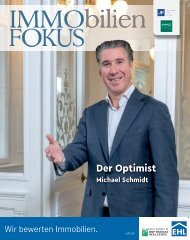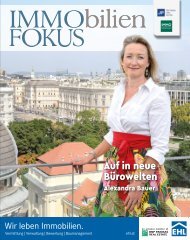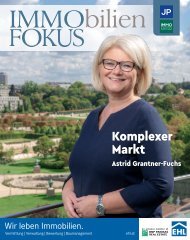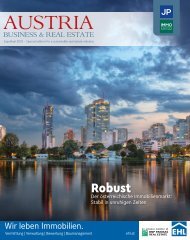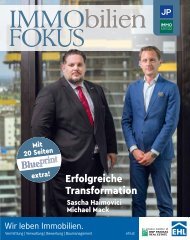MIPIM 2022 (21 MB)
Create successful ePaper yourself
Turn your PDF publications into a flip-book with our unique Google optimized e-Paper software.
"The investment<br />
market is certainly<br />
still somewhat more<br />
localized in Austria<br />
than elsewhere."<br />
Anton Cermak,<br />
Beacon Invest<br />
in Europe to cover Eastern Europe. The area<br />
around Vienna was the obvious choice.<br />
The reason why the big international<br />
investors don't come to Austria is perhaps<br />
that they can't assess the market well<br />
enough. Austrians are also reluctant to<br />
invest in the USA for legal and economic<br />
reasons.<br />
Franz Pöltl: Low volatility and stable developments<br />
do not really fit the strategy of the<br />
opportunistic Anglo-Saxon investors. Their<br />
business model is usually to exploit the<br />
fluctuations of the cycle. The amplitudes on<br />
the Austrian real estate market are simply<br />
too limited.<br />
David Moese: I can fully confirm that.<br />
From the perspective of the US American,<br />
investments in Austria are just not that<br />
interesting. The market is perhaps also too<br />
dull for them.<br />
What are international investors looking<br />
for in Austria? Is it primarily office and<br />
residential real estate?<br />
David Moese: I wouldn't rule out any asset<br />
class. We see that with our investors as well.<br />
Basically, all of them are interesting. Whereby<br />
the country hotel outside of Vienna is certainly<br />
not the main focus focus.<br />
Anton Cermak: I think residential and office<br />
properties are the focus. Some asset classes are<br />
perhaps somewhat less of an option. Mainly<br />
because the size of the properties is too small.<br />
For example, logistics. What we see here as a<br />
large logistics project is considered small or<br />
at most medium-sized in Germany, France or<br />
Italy. Overall, it is safe to say that the Austrian<br />
market is simply too small for large international<br />
investors.<br />
Will the fact that a German institutional<br />
investor acquired an apartment building<br />
portfolio last year remain just an exception?<br />
Franz Pöltl: That is likely to remain an<br />
outlier. It is difficult enough for Austrians to<br />
deal with the Austrian Tenancy Act (MRG)<br />
in its full scope of application. One certainly<br />
cannot expect international investors to<br />
tackle it. That is also why hardly any foreigners<br />
have invested in the apartment house sector<br />
in the past. When they did, they always<br />
had connections to Austria or Austrian roots.<br />
Another factor is the returns: If you had<br />
kept your investment for a long time, you<br />
certainly could have been able to earn good<br />
money. But the cash-on-cash returns that<br />
international investors like to see has, as you<br />
know, eroded a lot in the apartment building<br />
sector.<br />
Since you mentioned the MRG: What<br />
hurdles and challenges do you still see in<br />
Austria for international investors?<br />
David Moese: Because we just talked about<br />
apartment buildings, there is also the tax<br />
aspect in Austria. I have a tax disadvantage if I<br />
don't have an operation, such as pension funds<br />
or insurance companies. This is different in<br />
Germany when I can buy similar products.<br />
As far as the legal hurdles are concerned, the<br />
example of nursing care real estate comes to<br />
mind. International investors would have to<br />
deal with nine different building regulations<br />
and care legislation procedures here.<br />
<strong>MIPIM</strong> | <strong>2022</strong><br />
23




